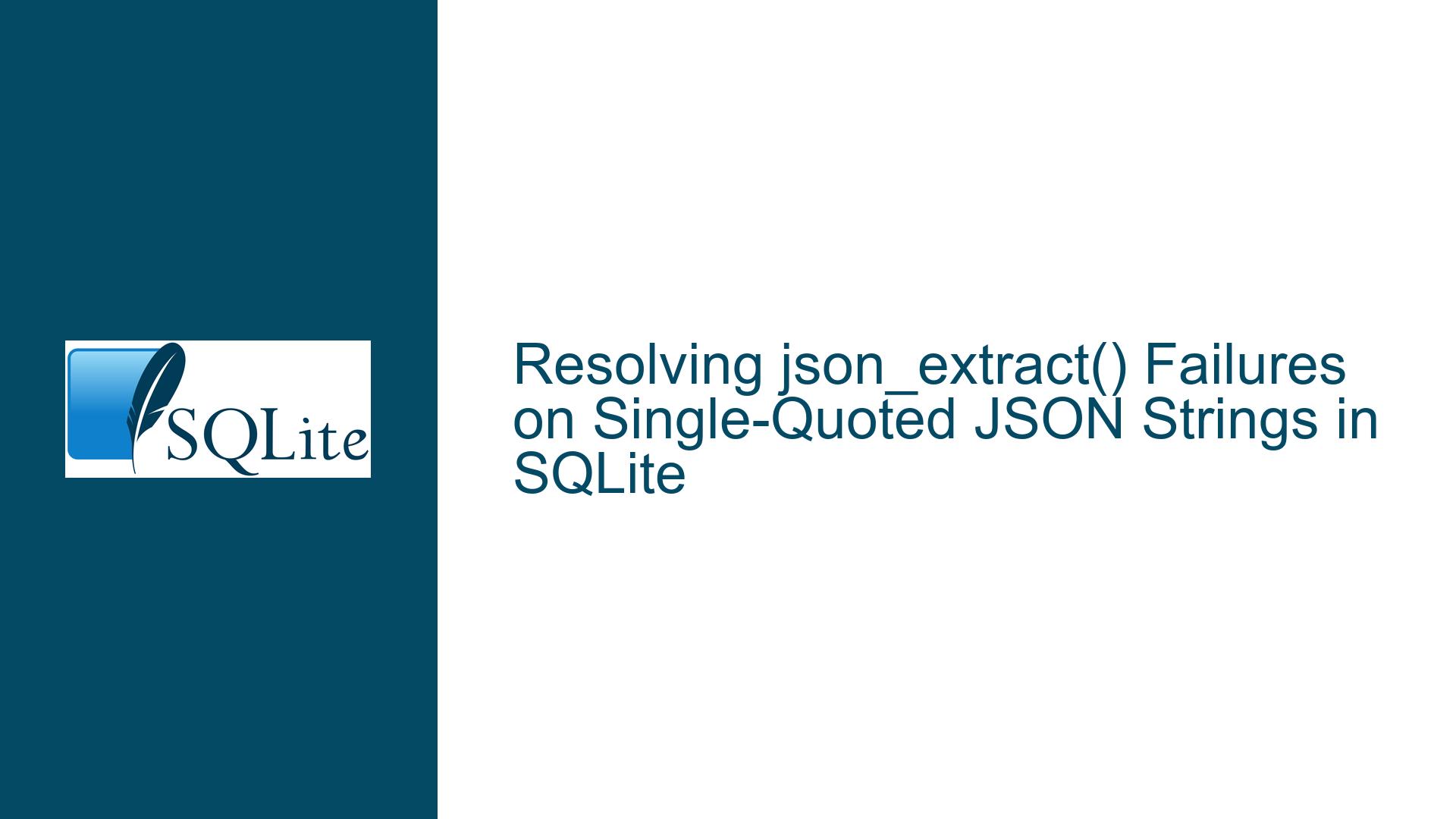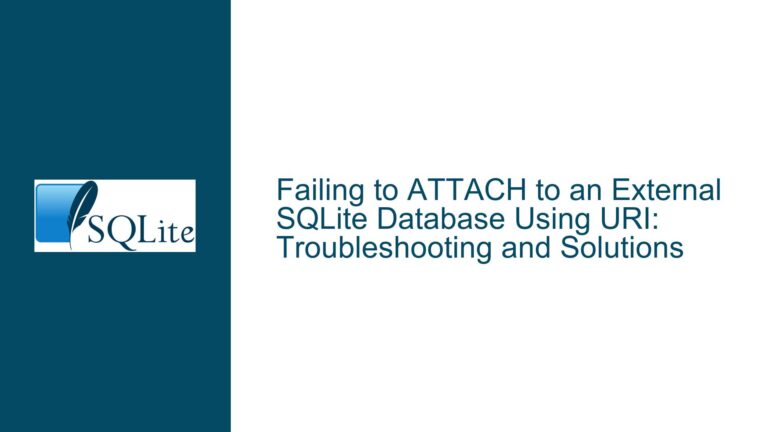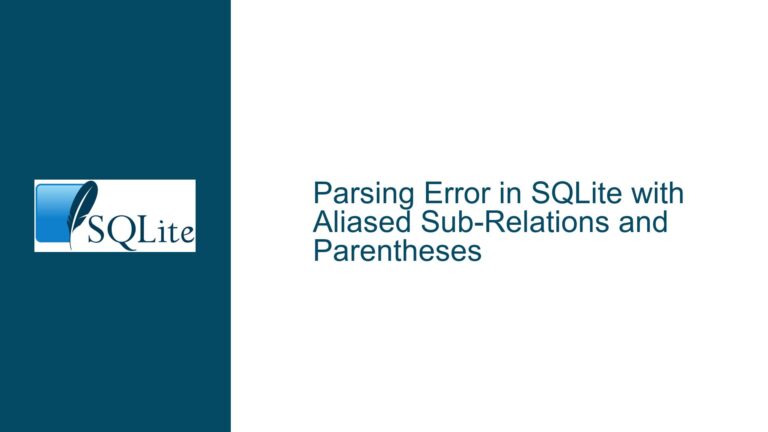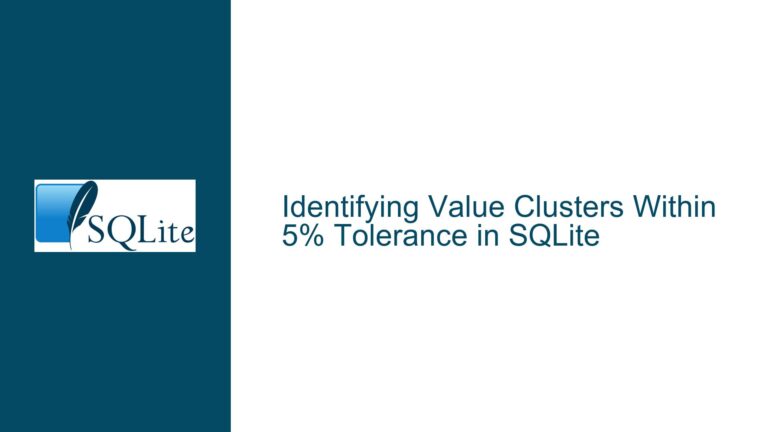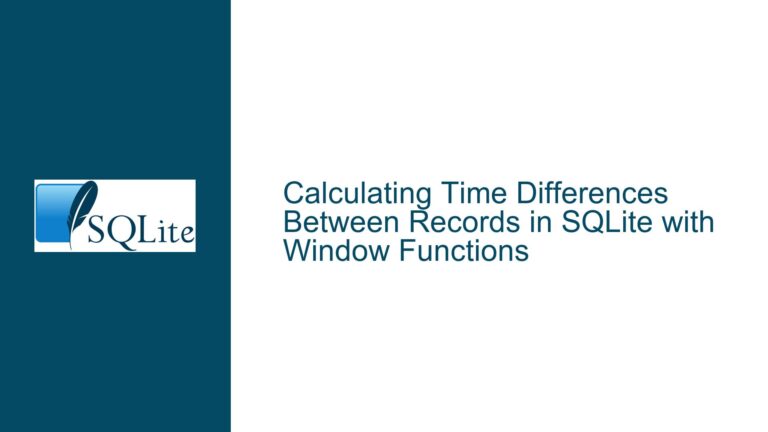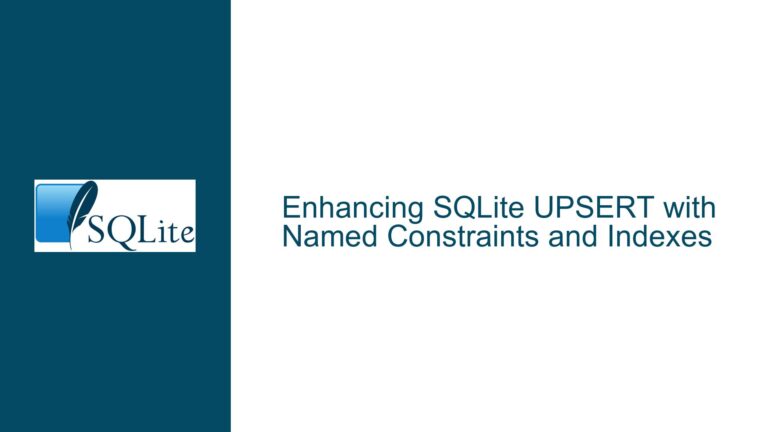Resolving json_extract() Failures on Single-Quoted JSON Strings in SQLite
Issue Overview: json_extract Fails on Single-Quoted JSON Strings Despite json_valid Confirming Validity
A common challenge arises when working with SQLite’s JSON functions where json_extract() returns empty results even after json_valid() confirms the JSON is valid. This occurs specifically when handling non-standard JSON strings containing single quotes instead of double quotes. For example:
SELECT json_valid(json_quote("{'a':'xyz'}")) AS validity_check; -- Returns 1 (valid)
SELECT json_extract(json_quote("{'a':'xyz'}"), '$.a'); -- Returns NULL
The root conflict stems from three key misunderstandings:
- The distinction between JSON strings and JSON objects in SQLite
- The behavior of json_quote() versus json()
- Version-specific handling of quote conversion in SQLite (pre-3.42 vs 3.42+)
SQLite treats JSON as text with validation rules. While json_valid() checks syntax validity, it doesn’t verify structural integrity for path queries. A JSON string containing {'a':'xyz'} wrapped in quotes becomes a valid JSON string literal but not a queryable JSON object. This creates a scenario where:
json_valid()passes because the outer quotes make it a valid stringjson_extract()fails because there’s no JSON object to traverse
The json_quote() function exacerbates this by explicitly converting input to a JSON string literal. For instance:
SELECT json_quote("{'a':'xyz'}"); -- Output: "{'a':'xyz'}" (as JSON string)
SELECT json_type(json_quote("{'a':'xyz'}")); -- Output: 'text' (not 'object')
This output is a JSON string containing the characters {'a':'xyz'}, not a parsed JSON object with key-value pairs. Consequently, json_extract() cannot locate $.a because the entire value is a single text node, not a hierarchical structure.
Possible Causes: Misuse of JSON Functions, String vs. Object Confusion, and Version Limitations
1. json_quote() Misapplication
The json_quote() function is designed to convert SQL values into JSON string literals, not to parse or repair invalid JSON. When applied to a string like "{'a':'xyz'}", it:
- Escapes internal double quotes (if present)
- Wraps the entire input in double quotes
- Does not convert single quotes to double quotes
Example:
SELECT json_quote("{'a':'xyz'}");
-- Output: "{'a':'xyz'}" (JSON string)
-- Valid JSON string but not a JSON object
This creates a valid JSON string that json_extract() cannot query, as it expects a JSON object or array.
2. JSON String vs. JSON Object Ambiguity
SQLite’s JSON functions differentiate between:
- JSON strings: Text values wrapped in quotes (e.g.,
"Hello","{'a':'xyz'}") - JSON objects: Unquoted key-value structures (e.g.,
{"a":"xyz"})
json_valid() returns 1 for both valid JSON strings and objects, but json_extract() only operates on objects/arrays. This leads to false confidence when relying solely on json_valid() for data readiness.
3. SQLite Version Constraints
Prior to v3.42.0 (2023-05-16), SQLite’s json() function could not automatically convert single-quoted strings to valid JSON. For example:
-- SQLite < 3.42.0
SELECT json("{'a':'xyz'}");
-- Output: "{'a':'xyz'}" (invalid JSON object)
In v3.42.0+, the json() function gained the ability to translate single quotes to double quotes:
-- SQLite ≥ 3.42.0
SELECT json("{'a':'xyz'}");
-- Output: {"a":"xyz"} (valid JSON object)
Older versions require manual quote replacement to achieve valid JSON objects.
4. Implicit Type Conversion Pitfalls
When storing JSON-like strings in SQLite tables, developers often use TEXT columns. However, inserting non-JSON strings (e.g., {'a':'xyz'}) without validation leads to silent failures. Even if json_valid() is used post-insertion, it may validate strings rather than objects, creating a mismatch between storage and query expectations.
Troubleshooting Steps, Solutions & Fixes: Valid JSON Generation and Version-Specific Workarounds
1. Pre-Validation and Correction of JSON Input
Ensure all JSON strings stored in the database adhere to RFC 8259 standards (double-quoted keys/values). Use replace() to convert single quotes before processing:
-- Convert single-quoted strings to valid JSON
SELECT replace('{'a':'xyz'}', '''', '"') AS corrected_json;
-- Output: {"a":"xyz"}
Apply this correction before JSON function usage:
SELECT json_extract(replace('{'a':'xyz'}', '''', '"'), '$.a');
-- Output: "xyz"
2. Proper Use of json() vs. json_quote()
- json(): Converts SQL text to a JSON object/array if possible. In v3.42.0+, it auto-converts single quotes.
- json_quote(): Converts SQL text to a JSON string literal.
Correct Approach for Object Creation:
-- SQLite ≥ 3.42.0
SELECT json("{'a':'xyz'}"); -- Output: {"a":"xyz"}
SELECT json_extract(json("{'a':'xyz'}"), '$.a'); -- Output: "xyz"
-- SQLite < 3.42.0 (manual correction required)
SELECT json(replace("{'a':'xyz'}", '''', '"')); -- Output: {"a":"xyz"}
3. Version-Specific Upgrade Guidance
Upgrading to SQLite ≥ 3.42.0 resolves single-quote conversion issues:
# Download latest SQLite amalgamation
wget https://www.sqlite.org/2023/sqlite-amalgamation-3420000.zip
unzip sqlite-amalgamation-3420000.zip
cd sqlite-amalgamation-3420000
gcc shell.c sqlite3.c -lpthread -ldl -lm -o sqlite3
After upgrading:
SELECT json("{'a':'xyz'}") AS json_object;
-- Output: {"a":"xyz"} (valid JSON object)
4. Schema Design Best Practices
- Validation Constraints: Use
CHECK(json_valid(...))on columns storing JSON to reject invalid entries:CREATE TABLE data ( id INTEGER PRIMARY KEY, content TEXT CHECK (json_valid(content) AND json_type(content) = 'object') ); - Strict JSON Typing: Store only valid JSON objects/arrays, not arbitrary strings.
5. Diagnostic Queries for JSON Structure
Use json_type() and json_valid() to audit stored data:
SELECT
content,
json_valid(content) AS is_valid,
json_type(content) AS json_type
FROM data;
Output analysis:
| content | is_valid | json_type |
|---|---|---|
| "{‘a’:’xyz’}" | 1 | text |
| {"a":"xyz"} | 1 | object |
6. Batch Correction of Existing Data
For legacy data with single-quoted JSON:
UPDATE data
SET content = replace(content, '''', '"')
WHERE content LIKE '%''%';
After correction, verify with:
SELECT json_extract(content, '$.a') FROM data;
7. Edge Case: Escaped Single Quotes
If original data contains intentional single quotes (e.g., {'message':'Don't panic'}), use a two-step replacement:
-- Preserve intentional single quotes
UPDATE data
SET content = replace(content, '''', '"');
-- Result: {"message":"Don"t panic"} (invalid)
-- Alternative: Escape single quotes in SQL
UPDATE data
SET content = replace(content, '''', '\'');
SELECT json_extract(replace(content, '''', '"'), '$.message');
8. Application Layer Sanitization
Implement pre-insertion JSON validation in application code:
import json
def validate_json(input_str):
try:
# Attempt to parse after replacing single quotes
parsed = json.loads(input_str.replace("'", '"'))
return json.dumps(parsed) # Return valid JSON
except json.JSONDecodeError:
raise ValueError("Invalid JSON input")
9. Performance Considerations
- Indexed JSON Columns: Use generated columns to index frequently queried JSON paths:
CREATE TABLE data ( id INTEGER PRIMARY KEY, content TEXT, a_value TEXT GENERATED ALWAYS AS (json_extract(content, '$.a')) VIRTUAL ); CREATE INDEX idx_a_value ON data(a_value); - Avoid Runtime Conversions: Pre-correct JSON strings during insertion rather than applying replace() during queries.
10. Cross-Version SQL Compatibility
For code targeting multiple SQLite versions, use conditional logic:
-- Check SQLite version
SELECT sqlite_version() AS version;
-- Use json() if ≥ 3.42.0, else use replace()
SELECT
CASE
WHEN CAST(substr(sqlite_version(), 1, 4) AS REAL) >= 3.42 THEN
json_extract(json(content), '$.a')
ELSE
json_extract(replace(content, '''', '"'), '$.a')
END AS a_value
FROM data;
By methodically addressing input validation, function selection, version constraints, and schema design, developers can ensure reliable JSON operations in SQLite. The key is recognizing that json_valid() only verifies syntactic validity at the top level, not the structural integrity required for path-based extraction.
